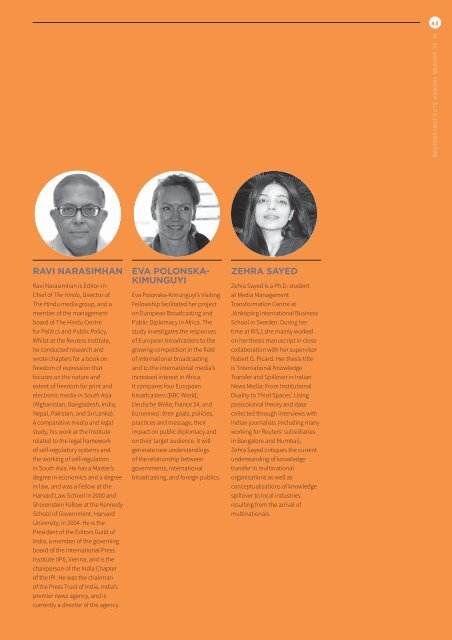7rcJ7W
7rcJ7W
7rcJ7W
Create successful ePaper yourself
Turn your PDF publications into a flip-book with our unique Google optimized e-Paper software.
43<br />
REUTERS INSTITUTE ANNUAL REPORT ’13-’14<br />
RAVI NARASIMHAN<br />
Ravi Narasimhan is Editor-in-<br />
Chief of The Hindu, Director of<br />
The Hindu media group, and a<br />
member of the management<br />
board of The Hindu Centre<br />
for Politics and Public Policy.<br />
Whilst at the Reuters Institute,<br />
he conducted research and<br />
wrote chapters for a book on<br />
freedom of expression that<br />
focuses on the nature and<br />
extent of freedom for print and<br />
electronic media in South Asia<br />
(Afghanistan, Bangladesh, India,<br />
Nepal, Pakistan, and Sri Lanka).<br />
A comparative media and legal<br />
study, his work at the Institute<br />
related to the legal framework<br />
of self-regulatory systems and<br />
the working of self-regulation<br />
in South Asia. He has a Master’s<br />
degree in economics and a degree<br />
in law, and was a Fellow at the<br />
Harvard Law School in 2000 and<br />
Shorenstein Fellow at the Kennedy<br />
School of Government, Harvard<br />
University, in 2004. He is the<br />
President of the Editors Guild of<br />
India, a member of the governing<br />
board of the International Press<br />
Institute (IPI), Vienna, and is the<br />
chairperson of the India Chapter<br />
of the IPI. He was the chairman<br />
of the Press Trust of India, India’s<br />
premier news agency, and is<br />
currently a director of the agency.<br />
EVA POLONSKA-<br />
KIMUNGUYI<br />
Eva Polonska-Kimunguyi’s Visiting<br />
Fellowship facilitated her project<br />
on European Broadcasting and<br />
Public Diplomacy in Africa. The<br />
study investigates the responses<br />
of European broadcasters to the<br />
growing competition in the field<br />
of international broadcasting<br />
and to the international media’s<br />
increased interest in Africa.<br />
It compares four European<br />
broadcasters (BBC World,<br />
Deutsche Welle, France 24, and<br />
Euronews): their goals, policies,<br />
practices and message, their<br />
impact on public diplomacy and<br />
on their target audience. It will<br />
generate new understandings<br />
of the relationship between<br />
governments, international<br />
broadcasting, and foreign publics.<br />
ZEHRA SAYED<br />
Zehra Sayed is a Ph.D. student<br />
at Media Management<br />
Transformation Centre at<br />
Jönköping International Business<br />
School in Sweden. During her<br />
time at RISJ, she mainly worked<br />
on her thesis manuscript in close<br />
collaboration with her supervisor<br />
Robert G. Picard. Her thesis title<br />
is ‘International Knowledge<br />
Transfer and Spillover in Indian<br />
News Media: From Institutional<br />
Duality to Third Spaces’. Using<br />
postcolonial theory and data<br />
collected through interviews with<br />
Indian journalists (including many<br />
working for Reuters’ subsidiaries<br />
in Bangalore and Mumbai),<br />
Zehra Sayed critiques the current<br />
understanding of knowledge<br />
transfer in multinational<br />
organisations as well as<br />
conceptualisations of knowledge<br />
spillover to local industries<br />
resulting from the arrival of<br />
multinationals.


